Colicky Baby: Can a Low FODMAP Diet Help Colic? with Kate Scarlata, MPH, RDN
- Why grains are not “bad” for your baby’s gut…and how they actually help gut health
- What diagnostic criteria we need for IBS and why babies can’t have it
- How low FODMAP diets may mediate colic symptoms…but not by modifying the baby’s diet

LISTEN TO THIS EPISODE
Episode Description
Do certain foods trigger colic or gut symptoms in your baby? Eliminating FODMAP foods can help adults with irritable bowel syndrome, but should babies be on a low or no FODMAP diet? Kate Scarlata joins me to talk about whether or not a low FODMAP diet can help with colic for colicky babies.

About the Guest
- Kate Scarlata, MPH, RDN is a gut health and nutrition expert who specializes in the low FODMAP diet
- Kate is an avid writer, speaker and author and just released her latest book Mind Your Gut, co-written with a GI psychologist
Other Episodes Mentioned in this Episode
- Episode 267 - Fermented Foods: Can Babies Safely Eat Fermented Foods?
- Episode 202 - Gut Check: Microbiome and Food Allergy Development with Liam O'Mahony, PhD
- Episode 108 - Probiotics: Should Your Baby Be Taking Probiotics? with James Marin, RD, EN and Dahlia Marin, RDN, LD
Links from Episode
- Check Kate Scarlata out online on her website: https://www.katescarlata.com/
- Kate is on Instagram @katescarlata
- DIGID: Dietitians in Gluten and Gastrointestinal Disorders (DIGID)
- Find a GI Registered Dietitian on the Eat Right site: https://www.eatright.org/find-a-nutrition-expert
- Get Kate’s book Mind Your Gut: The Science-based, Whole-body Guide to Living Well with IBS - Kate Scarlata on Amazon here (affiliate link) https://amzn.to/3Pjt7Od


Latest Episodes
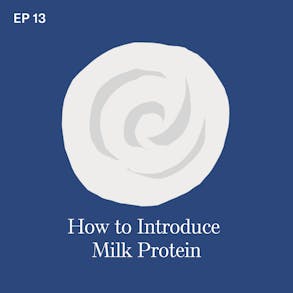
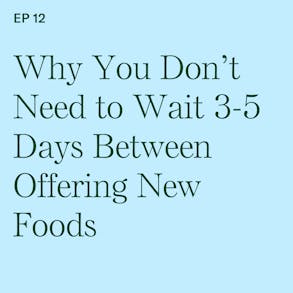
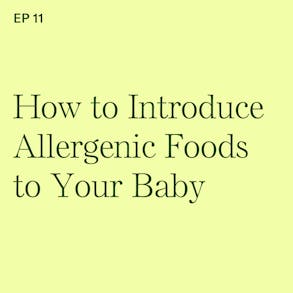
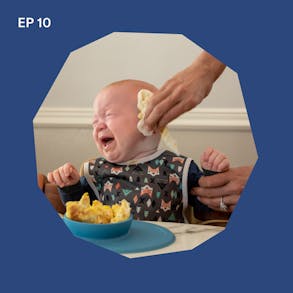
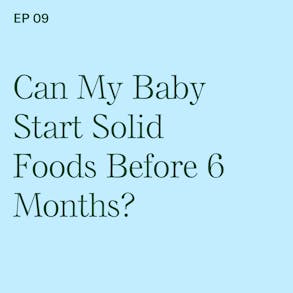
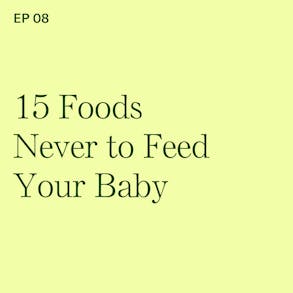
Katie Ferraro (0s):
How is the mental load of motherhood going for you? This baby stuff is a lot, right? Well my goal is to give you one less thing to worry about and that's, hmm, what am I gonna feed the baby. If you are looking for a one stop solution that literally teaches you exactly how to safely help your baby learn how to eat real food. I wanna invite you to join my signature online program called Baby-Led Weaning with Katie Ferraro. This is the most comprehensive Baby-Led Weaning program out there. I give you 20 weeks of meal plans for Baby-Led Weaning to help your baby safely eat five new foods a week, which means they're going to finish their a 100 First Foods before turning one As one mom who recently joined the program said "our lifestyle does not give us any mental capacity to think more about what to do with this baby.
Katie Ferraro (44s):
This program caters to our needs inside of the program". I have my h100 First Foods content library to show you exactly how to safely prepare all of the 100 First Foods for your baby's current age and stage. My 100 First Foods daily meal plan is also included in there. It's all in one place. And a mom in our program. she said she joined because "I'm too tired of trying to figure out so many different things at once. I want someone to tell me what to do to catch up my 9-month so we can stop using the same familiar foods we've been feeding her". If you are a type A organized per person or like let's say you wanna be that kind of person, you wanna be more organized in what you feed your baby, then I created the Baby-Led Weaning with Katie Ferraro program for you.
Katie Ferraro (1m 24s):
You can sign up at babyledweaning.co/program. I have one program with all the stuff you need inside of it to get this thing done and get on with your life. Again, that's babyledweaning.co/program. Check it out and I hope to see you there.
Varon Baby (1m 41s):
What type of bib are you using for Baby-Led Weaning? Personally, I'm not a fan of those tent like contraptions that go over the whole tray or over your baby's body. The like super long sleeve ones that can restrict the baby's range of motion and also the silicone nibs can be really heavy. They drag baby's head down plus the through blocks your baby's ability to get up close at the table to explore their new foods. But the bibs that I do love for Baby-Led Weaning are from a company called Bain Baby. Now Bain is a small mom owned business and their founder Kelsey, has designed the perfect bib. She calls it a Varon, which is a hybrid between a bib and an apron. It does not restrict your baby's range of motion. So aprons are a pin of four style bib. They tie under your baby's Shoulder Blades so it's not like all up in their neck, which can be a really negative sensory experience. Plus babies can't untie or rip off aprons when they get older, which is an added bonus. varon makes these huge lightweight splash mats that you also need to put underneath your baby's chair for minimizing the BLW mess. You can get 10% off of everything at Varon Baby with my affiliate discount code KD10. Again, the discount code is KD10. Here's a pro tip. If you're shopping vains the size toddler bib is actually the right one for babies, six months to two years. So start with toddler and then you size up to the preschool size Varon for your older babies and toddlers. So the code again, KD10 varonbaby.com. And if you wanna hear more about Kelsey's journey beginning her business, go listen to episode one 18 where I interview her, the vain founder about how she built what I think is the best Baby-Led Weaning bib out there.
Katie Ferraro (3m 13s):
Vain, There were two small studies from the Monash group. They are of the pioneers that came up with the FODMAP approach. They looked in infants with colic, they gave the parents the breastfeed. These were nine week old kids. They were not eating anything, obviously just exclusively breastfed. And they put the moms on a low FODMAP diet for a number of weeks and then them over to their typical diet. And what they found was when the mom was on a low FODMAP diet, the colic episodes dropped pretty dramatically. It is showing a really interesting relationship. Hey there, I'm Katie Ferraro, Registered dietitian, college nutrition professor and mom of seven specializing in Baby-Led Weaning.
Katie Ferraro (3m 59s):
Here on the Baby-Led Weaning with Katie Ferraro podcast, I help you strip out all of the noise and nonsense about feeding, giving you the confidence and knowledge you need to give your baby a safe start to solid foods using Baby-Led Weaning Do certain foods, trigger colic or gut symptoms in your baby. Maybe you're breastfeeding and you totally noticed that like when you eat onions or mushrooms or other foods, it just sets your baby's gut off. And what about parents who have colicky babies would altering your baby's diet or maybe even your own diet if you're breastfeeding? Would that help reduce the symptoms of colic? My guest today is Kate Scarlata. She's a dietitian, she's a gut health and nutrition expert who specializes in the low FODMAP diet.
Katie Ferraro (4m 43s):
Now if you've never heard of the low FODMAP diet or you've heard about it but you're like me and can't repeat all of the long sugar names that make up the acronym fodmap, don't worry, Kate is gonna set us straight. She's the world's foremost leading nutrition authority on the low FODMAP diet. And so I was reading an article out of Monash University in Australia. They're like really the hotbed of FODMAP research and practice. And this particular article posited that a low FODMAP diet might be able to help reduce colic symptoms in babies. And I was like, that's interesting 'cause I get all sorts of interesting questions from parents around the world about feeding their babies. And I've had a few parents who've themselves experimented with a low FODMAP diet, it helped their irritable bowel syndrome or IBS and maybe some other gut issues immediately.
Katie Ferraro (5m 24s):
So they wanted to know like is this low FODMAP diet safe for their babies to try? So that's why I wanted to get Kate on the podcast. She's the expert pick her brain about the relationship between FODMAP and your baby's gut health. So if you're an adult with IBS or gut issues, you definitely will want to check out Kate Scarlett's work. She just published her most recent book. She co-wrote this with a GI psychologist. We're gonna talk a little bit about that in this interview. It's called Mind Your Gut, the Science-based whole Body Guide to Living Well with IBS. And the key here is that Kate's approach, like all dietitians, is science-based. Okay? 'Cause there's so much misinformation out there there about gut health from supplement manufacturers who are trying to sell you lotions and potions that claim to cure your IBS to the grain-free diet guys who want you to think that you and your baby's bodies can't digest grain foods, be sure to listen to the whole episode 'cause Kate's gonna get into like that controversy about whether or not grains are quote unquote bad for your baby.
Katie Ferraro (6m 16s):
'Cause increasingly parents are getting messages, it's usually from package and process grain-free snack brands that there's something wrong or indigestible about grains. She's gonna explain why that's flat out wrong. One thing I love about doing this podcast, it's the opportunity to interview other feeding and nutrition experts like Kate Scarlata. And so if you're not already following this podcast, please hit subscribe so that both of the weekly episodes that I release will show up in your feed. I do a mini Baby-Led Weaning training episode every Monday and then a longer feeding expert interview each Thursday. So please do subscribe and if you have a mom friend who's also starting solid foods soon, please tell her about the Baby-Led Weaning with Katie Ferraro podcast because your word of mouth recommendations are so important for the growth and success of this show.
Katie Ferraro (6m 58s):
So with no further ado, I wanna bring on Kate Scarlata who will be teaching us about whether or not a low FODMAP diet can help with colic. And she's gonna cover a host of other really interesting adult and baby that stuff.
Katie Ferraro (7m 47s):
can have biopsied like you would lactase, right is an enzyme for lactose absorption and digestion.
Kate Scarlata (7m 13s):
This was an 8-year-old little boy that came to see me. His mother had seen me as well and had some digestive concerns and he had ongoing diarrhea, a little bit of weight loss and bloating. They diagnosed him with IBS and kind of left it there. But the mom had brought up that he was having issues with sweets and certain fruits and vegetables that I identified as being high in sucrose. And I thought, hmm, I wonder if he has low sucrase–isomaltase. And this is a digestive enzyme complex that you. Just to give you some examples of some of the high sucrose foods, apples, apricots, cantaloupe and some of the favorites vegetables like carrots and sweet potatoes and corn.
Kate Scarlata (8m 9s):
Those all have sucrose in them. And so anyway, this young little kid we sent to the GI doctor and they scoped him and checked for his assays. So it's called a disaccharide assay. And they determined that he had a low sucrase–isomaltase production and the treatment for this is actually an enzyme, it's called sase. And that covers all sucrose digestion. So with that addition, he could eat sucrose containing foods with no problem. The problem with this enzyme complex is that it also, the isomaltase piece of it helps us digest starches and that enzyme complex doesn't help with that.
Kate Scarlata (8m 49s):
So we adjusted some of his starch intake as well and off he went and is, you know, is growing and doing well and you know, it was, it was an interesting mother daughter, you know, scenario. Sometimes we'll see that like IBS or IBS symptoms run in families. Mom didn't have this condition but, but he did and and really responded well. So it can be really life changing. It's, it's interesting.
Katie Ferraro (9m 16s):
You piqued my interest when you said an 8-year-old that had like some issues with sugar. I have a set of quadruplets that are eight years old and I'm like, oh they have some issues with sugar but it's not like the fruits. It was interesting to like, oh my gosh, these are the naturally occurring sources of sugar that are in the diet. That can be problematic as well. And that's why I think and always encourage patients, you know, it's so important, especially with gut stuff, that you're talking to a qualified and credentialed professional that you don't try to self-diagnose these things. 'Cause I think we'll talk about it today in the interview, but like the gut is so highly individualized and what works for one person doesn't work for another. So we are here today to talk about FODMAP or a low FODMAP diet. Whenever I hear anyone talking about FODMAPs, my brain always shifts like Kate Scarlata, like you are a world renowned low FODMAP diet expert.
Katie Ferraro (9m 57s):
And I think though that for the general population, this concept of FODMAPs, it's still pretty new to a lot of people. So can you explain what a low FODMAP diet is and how it works?
Kate Scarlata (10m 7s):
Absolutely. So let's start with FODMAPs 'cause it's an acronym and it stands for fermentable, oligosaccharides, disaccharides, monosaccharides and polyols. And these are, you know, long complicated words, but basically they're a group of small sugars and fibers that are commonly malabsorbed. And so collectively one of the FODMAPs for instance is lactose. It's a disaccharides. So that's the D in FODMAP. And in this diet it's a three phase intervention where we restrict all very high FODMAP foods from the diet and see how the individual does. Hopefully their gut will calm down. This is a diet specific for irritable bowel syndrome.
Kate Scarlata (10m 52s):
And then after we restrict the FODMAPs from the diet from two to six weeks, then we reintroduce FODMAPs back in. And we do this very systematically with a little bit of lactose on day one and then a little bit more and a little bit more. And we really get a sense of what FODMAPs are triggering the symptoms. Most people are not troubled by all FODMAP sources. And then the third phase is a personalization phase where we add back foods in the FODMAP group that do not trigger symptoms. 'Cause the goal for anyone, adult or child is the most liberal diet possible. We want our kids especially, but our adults too, to have a good food relationship and have fun joy in eating.
Kate Scarlata (11m 35s):
So we don't want an overly restrictive diet, but this diet, especially in the adult patient population has done very well. It can be effective at managing symptoms and 50 to 80% of you know adults that use it.
Katie Ferraro (11m 50s):
Hey, we're gonna take a quick break, but I'll be right back.
BetterHelp (11m 59s):
This episode is brought to you by BetterHelp. If you've been thinking about giving therapy a try, BetterHelp is a great option. It's a convenient, flexible, affordable, and entirely online experience. All you do is just fill out a brief questionnaire to get matched with a licensed therapist and you can also switch therapists at any time for no additional charge. I used to think therapy was just for people who have experienced major trauma, but therapy can help you be at your best no matter what you're going through. So whether it's to learn new positive coping skills, set more realistic boundaries, or just show up as a better version of yourself, BetterHelp is here to help. Therapy can help you find what matters to you so that you can do more of it. If you wanna live a more empowered life, therapy can help you get there. And BetterHelp can help you. Visit betterhelp.com/weaning today to get 10% off your first month. That's betterhelp.com/weaning and get 10% off your first month. So our audience consists
Katie Ferraro (13m 13s):
primarily of parents and caregivers of babies who are six to 12 months of age and about to start solid foods. And just like in adult nutrition, there are some pretty wacky theories out there about babies and gut health. Like parents will come to me like, oh Katie, I heard from this like no grain diet guy that babies can't digest grains, I'm not gonna feed them. And we have a whole 100 First Foods list and there's 20 different starchy foods. I'm gonna skip all of those. Or oh, I'm buying these like grain-free puffs for my baby. 'cause brain grains are bad for digestion. And I wanted to ask you Kate, as a specialist in GI Nutrition for a typically developing baby who does not have a history of GI disease or disorder, is there any validity to these claims about grains being quote unquote bad for a baby's gut?
Kate Scarlata (13m 50s):
Well first of all, the ingredients or the part of grains that are poorly digested are feeding our gut microbes. So when people say, oh they're difficult to digest, that's not a bad thing. Fiber is not digested and we know fiber reduces cancer risk keeps heart disease away, makes us poop. So when you're talking about difficult to digest foods, just remember that's not necessarily a bad thing. So whole grains as a general rule are associated with good health and a better microbiome. They're very rich in a type of carbohydrate called fructans, which feeds health promoting gut microbes.
Kate Scarlata (14m 35s):
And on our littles they're just establishing their gut microbiome for their life. So we want to feed their microbes. And so poorly digested foods are feeding the gut microbes. Just remember that it's not about just assimilating every nutrient, we gotta feed the microbes within. 'Cause we know that they help us produce vitamins, they keep our immune system in check. They do a lot of important things. So don't listen to the gurus out there on TikTok and speak to a Science-based practitioner.
Katie Ferraro (15m 7s):
So gut health, as we all know, it's highly individualized. What sets one person's gut off can make someone else feel better or vice versa. I remember back when I first met you in person, you were in San Diego and I was the president of the San Diego Dietetic Association. You were doing a presentation for us and I was working in adult nutrition and ACTA yogurt came out and remember like half of my patients claim like oh my gosh, this is my gut savior. And the other half were like, that product rips my gut up. So I know you work a lot with adults who have irritable bowel syndrome, but I'm wondering, can babies be diagnosed with IBS?
Kate Scarlata (15m 37s):
So not typically, and I'll tell you why. It's not that they maybe don't have IBS, it's, but IBS is a symptom-based diagnosis. So the individual really has to describe abdominal pain and you know, you're not gonna have a six month old saying I have abdominal pain when I eat or be able to describe that. The mom might have a sense, but it's usually diagnosed three and above but just, you know, it doesn't fully discriminate. IBS really can cross all ages, but typically we're talking about children not not infants or babies.
Katie Ferraro (16m 11s):
So I've had a few parents, Kate ask about a low FODMAP diet for babies. So that was kind of the impetus to have you on for this episode. But as I was preparing for the interview and reading, I came across an article from Monash University, which maybe you can tell us a little about them and I know they're highly involved in FODMAPs and I see your name linked with Monash a lot, but he was talking about infantile colic. So it was like the diagnosis management and role of the FODMAP diet in colic. And I'll link to that in the description in the show notes. But I was just wondering like could you summarize for us, I'd never heard that. Is the low FODMAP diet helpful for colicky babies?
Kate Scarlata (16m 44s):
We can't say that for sure, but there were two small studies from the Monash group and you're right, they are the pioneers that came up with the FODMAP approach. They looked in infants with colic, they gave the parents the breastfeed of these were nine week old kids, they were not eating anything, obviously just exclusively breastfed. And they put the moms on a low FODMAP diet for a number of weeks and then switched them over to their typical diet. And what they found was when the mom was on a low FODMAP diet, the colic episodes dropped pretty dramatically.
Kate Scarlata (17m 24s):
So it is an interesting concept. It is not what I would call a science-based therapy for moms to embark on, but it is showing a really interesting relationship, you know, because it's not like FODMAPs are leaking into the breast milk. It's probably some interaction, we don't know what it is, but I suspect it's some interaction with the gut microbiota in the mom that is getting into some kind of metabolite is getting into the breast milk. But there is a connection. So it is interesting.
Katie Ferraro (17m 56s):
You mentioned this like leaking into the breast milk maybe. What about maternal diet when breastfeeding can modifying mom's diet help with a colicky Baby?
Kate Scarlata (18m 6s):
There are some studies that show that maybe reducing cow's milk or switching a child from breast milk to like a soy-based formula may help with colic but there's not strong data for one specific diet therapy for the mom, breastfeeding mom of a colicky infant. I wish I knew because I, my oldest was colicky and it's, it's a challenging, you know, condition to deal with when you're a new parent.
Katie Ferraro (18m 32s):
Yeah, it's something that stays with you forever. Like you never ever forget the sound of a child screaming like 24/7.
Kate Scarlata (18m 40s):
No, no it's just heartbreaking for them.
Katie Ferraro (18m 42s):
But it is. Good to hear from the professional like you're not doing anything wrong mom You don't need to go do all these wacky elimination diets. Like kinda just hunting and pecking around the internet, picking out pieces from thin air and like trying to put together your best gut health diet. And Kate, I know you have a new book out, it's called Mind Your Gut, the Science-based Whole Body Guide to Living Well With IBS. I was intrigued that you co-wrote this book with a doctor of psychology. So I'm really fascinated by the intersection between gut health and the brain. And just curious, how was that process of co-writing a book and who did you write this book for?
Kate Scarlata (19m 12s):
So we wrote it for individuals that are living with irritable bowel syndrome. And the reason why I brought in a GI psychologist to partner with me is that we know that the gut and brain are highly linked and we can see that if you feel butterflies in your stomach when you feel a little nervous or you feel fearful and you fly to the toilet 'cause you gotta run to the bathroom. So the gut and brain are highly linked and the gut bacteria can produce different types of brain chemicals that can impact your mood. There's such a big connection there. We also know that there's a lot of behavioral therapies that work really well for managing IBS that don't require a diet.
Kate Scarlata (19m 56s):
So gut directed hypnosis. So we often use some of these behavioral therapies more frequently because when you mock around with a little kid's diet, you can really impact their relationship with food. And we are seeing an uptick in eating disorder risk and there is a connection with GI conditions in eating disorders. So about a quarter of adults, for instance, with a GI condition fit the criteria for disordered eating. We want our kids to have a healthy relationship with food that is so, so important. And so if we can give a therapeutic that doesn't mess with their diet, make it restrictive, reduce their nutrient intake, impact their food relationship, why not go there first?
Kate Scarlata (20m 43s):
And so I really wanted to introduce, you know, these GI psychology therapies to a wider audience and Dr. Real is amazing. So.
Katie Ferraro (20m 52s):
Hey we're gonna take a quick break but I'll be right back.
Ollie (21m 2s):
Your brain needs support and new Ollie brainy chews are a delightful way to take care of your cognitive health made with scientifically backed ingredients like Thai ginger, l-theanine and caffeine, brainy chew support, healthy brain function, and help you find your focus, stay chill or get energized, be kind to your mind and get these new tropic chews at olly.com. That's OLL y.com. These statements have not been evaluated by the Food and Drug Administration. This product is not intended to diagnose, treat, cure, or prevent any disease.
Katie Ferraro (21m 35s):
I have to admit, I've never heard of a GI psychologist. I assumed if anyone had it would be you. But I think it's really cool we're actually recording this on registered dietitian day. So we were talking a little bit before the interview about being a registered dietitian and just seeing kind of the evolution of dietitians and interfacing with different healthcare providers. I know I'm in the infant feeding space where my colleagues are primarily speech language pathologists and occupational therapists, feeding therapists who specialize in feeding and pediatricians. Like we can do so much more when we combine our skillset. And I think it's really amazing that you, the leading GI dietitian that we know in the US that you are linking to other non-diet therapies that are of course evidence-based. Because I can only imagine there is just so much wacky stuff that you hear.
Katie Ferraro (22m 15s):
I mean we could probably have a contest of like who hears crazier stuff about diet, like parents feeding babies or adults trying to fix their gut. So I think it still is important that people know what a registered dietitian is and how can someone find a GI dietitian, like if they're tired of hunting and pecking around the internet to try to fix their adult gut stuff and they don't wanna, you know, it is ruining the relationship with food and they don't wanna project that onto their children in the way they're raising their children. How can they get help from a dietitian?
Kate Scarlata (22m 41s):
Absolutely. Well for, for pediatricians a lot of the major medical centers will definitely have a dietitian in their GI division. So that's good news. You can go onto my website for, and again, this wouldn't be for your audience 'cause it's FODMAP oriented dietitians, but there is a listing for if you, there's older other dietitians or other people listening on katescarlata.com of course eat right has a listing of dietitians and there are subspecialties that you can filter out. So you can look at food intolerance or celiac disease to find specific dietitians with certain expertise.
Kate Scarlata (23m 24s):
And then the American Gastroenterological Association is creating a listing of GI dietitians that's underway. And also the Academy of Nutrition and Dietetics is working on a credential so that GI dietitians will be credentialed and that will also be wonderful for patients and people looking for an expert in GI.
Katie Ferraro (23m 43s):
Oh that is so fascinating. I, I'm glad we're focusing on that instead of adult and pediatric weight management. Like let's look at where people really need help. And I am, I'm sure you're involved with that and I'll be interested to see, is there a dietetic practice group for GI dietitians?
Kate Scarlata (23m 57s):
There is. So it's under the medical nutrition therapy and it's called, and it's a subgroup called Digit and it's.
Katie Ferraro (24m 2s):
I'llfFind the link. 'cause I think sometimes they also link to like people who specialize in that just so you, you know, 'cause I mean dietitians can help you with a lot of things, but you really do need someone with advanced training in GI if, if that's what you're working on. And I think it's great that there is future board certification coming. How long does that process take?
Kate Scarlata (24m 18s):
It's probably gonna be a three year process. You know, there's a lot of legwork in, in devising everything. So it does take a while. It's been rolling out with, you know, the work's probably started about a year ago, so I'm hopeful two to three years we'll have, we'll have it ready to roll.
Katie Ferraro (24m 36s):
Well Kate, thank you so much for this conversation. I appreciate it. Your book is out now, people wanna check it out. Where's the best place that they can go to learn more about your work and support your business and to get your book?
Kate Scarlata (24m 46s):
Thank you. So you can check me out on Instagram at katescarlata. I'm pretty active there. And then of course my website, which is katescarlata.com. Mind your gut is pretty much everywhere. So Amazon, the link is on my website as well. And of course Target, Walmart, it's out there.
Katie Ferraro (25m 7s):
Awesome. Well congratulations, I, I know it's your fifth book so you are definitely an expert at this, but I think it's really great that you co-wrote it and you're, you know, addressing some of these non-diet things too. 'cause the gut is so multifaceted.
Kate Scarlata (25m 19s):
Absolutely agree. Well thank
Katie Ferraro (25m 20s):
You Kate.
Kate Scarlata (25m 20s):
Thank you.
Katie Ferraro (25m 21s):
Well I hope you enjoyed that interview with Kate Scarlata. I know I always learn so much when I chat with her. I think it's so cool that she just like specializes in gut stuff. I had no idea about the disorder she was talking about for the 8-year-old boy. So there's a lot of stuff to learn about your Gut Check out her book. Again, it's called Mind Your Gut, the Science-Based Whole Body Guide to Living Well with IBS. I'll link all of her resources in the description right where you're listening to this podcast or if you go to the show notes, that's blwpodcast.com/434. A special thank you to our partners at AirWave Media. If you guys like podcasts that feature food and science and using your brain and remember your brain is connected to your Gut, Check out some of the other podcasts from AirWave Media. We're online at blwpodcast.com. Thanks so much for listening and I'll catch you next time.

The Program Baby-Led Weaning with Katie Ferraro
A step-by-step digital program for starting solid foods safely and navigating the original 100 FIRST FOODS™ meal plan with baby-led weaning.
 EXPERT-LED, PROVEN APPROACH TO EATING REAL FOOD
EXPERT-LED, PROVEN APPROACH TO EATING REAL FOOD CONCISE VIDEO TRAININGS TO MASTER BABY-LED WEANING
CONCISE VIDEO TRAININGS TO MASTER BABY-LED WEANING 100 FIRST FOODS DAILY MEAL PLAN WITH FOOD PREP VIDEOS
100 FIRST FOODS DAILY MEAL PLAN WITH FOOD PREP VIDEOS
Baby-Led Weaning for Beginners Free Workshop
Is your baby ready to start solid foods, but you’re not sure what to do? Register for this free online video workshop and learn how to give your baby a safe start to solid foods using baby-led weaning. Everyone on this free training receives a copy of Katie’s original 100 FIRST FOODS™ list. You can take this workshop right now, later today when your baby naps, or tomorrow…whatever works for you!
Get baby-led weaning recipes and tips delivered to your email inbox.